- Home
- Keith R. A. DeCandido
A Burning House Page 2
A Burning House Read online
Page 2
Klag beamed with pride that “Hero of Elabrej” was now being said of him. Already several songs had been composed about the battle, and Klag was pleased that his role was prominent in all of them. He was also grateful that the songwriters had not minimized Wirrk’s contribution. The Kravokh’s captain died gloriously, restoring his ship’s honor and dealing the decisive blow to the Elabrej, and that deserved to be memorialized.
To B’Oraq, however, he only said, “As I’ve told you in the past, I have done only what is necessary to make myself a better warrior and a more worthy captain of this vessel.”
Smirking, B’Oraq said, “I’ll take that as a ‘you’re welcome.’ ”
Klag sighed. B’Oraq’s eight years living in the Federation had poisoned her speech to an appalling degree.
Then B’Oraq leaned forward and kissed Klag hungrily on the mouth, biting down hard on his lip.
At first Klag did not return the gesture, for once, very unsure of himself.
While there were no specific regulations against captains having sexual relations with subordinates—mostly because the regulations were written before women served on Defense Force vessels and had never been rewritten to accommodate the change, not even during Azetbur’s reign—Klag had always been of the feeling that it was unwise to bed one’s officers, as it might give way to making decisions on the wrong basis. A captain needed to think with his head and with his heart, not with his loins. It was for that reason that Klag had limited his sexual encounters to the bekks—troops he would never directly interact with on duty were the only people he slept with while off it.
But he was unlikely to treat B’Oraq any differently. For one thing, he already considered her indispensible. He was unlikely to change this opinion, regardless of the quality of the sex they were about to have. And B’Oraq was too much the crusader to let anything interfere with her work as a physician.
So Klag grabbed B’Oraq’s shoulder-length hair at the back and yanked hard on it, then dragged her into his cabin, the door rumbling shut behind her.
B’Oraq wore a lighter armor that had greater ease of movement, so she was out of her uniform far faster than Klag was able to extricate himself from his. She spent the time it took him to unfasten the parts of his armor biting on the bits of flesh he had exposed, sending quivers of magnificent pain through Klag. At first, she nibbled, then worked her way up to furious bites, practically chewing on his flesh. Once his pants were gone, he grabbed her, digging his finger into her spinal ridge at her hip bone and dragging that finger up to her neck. She shivered at his touch.
Then he threw her onto his bunk, flesh and bone colliding enticingly with metal. Klag had never truly noticed how magnificent B’Oraq was as a woman. In fact, he had never truly thought of her as a woman before—she was simply the doctor, the one who harassed him about replacing his right arm and the one who later did everything she could to make his new arm function to the best of its ability.
Now, though, she was an attractive woman who was as hungry for him as he was now coming to realize he was for her.
She reached over at the stand next to his bed, grabbing the candleholder that his mother had given him when he got his commission. Rearing back, she threw it at him. He let the wrought iron strike him on his crest, reveling in the pain, snarling with ecstasy as he leapt on top of her. Klag had never been one for poetry, so he decided to forgo that part of the ritual, finding himself far too impatient to bother with such nonsense. It was amazing—up until the moment she kissed him, he never considered B’Oraq as a potential bedmate, but from the moment she bit his lip, his thoughts were suddenly consumed with her. The meeting with Kriz, the Gorkon’s considerable damage, the prospect of seeing his estranged brother—none of it mattered. All he cared about was his own body intertwined with that of the daughter of Grala.
Klag was honestly not sure how much later it was when he heard Commander Toq’s words over the speaker: “Bridge to Klag.”
Disentangling himself from B’Oraq—no easy feat, for they had wound up on the floor under his desk—Klag clambered to his feet and activated the intercom. “Klag.”
The Gorkon first officer said, “Sir, we have entered the home system, on approach to Praxis Station. Leskit estimates our docking time in seventeen minutes.”
Checking the timepiece that had been next to the candleholder, Klag saw that he was supposed to have reported to the bridge twenty minutes earlier. Toq, to his credit, had not interrupted his captain until it was absolutely necessary. Klag needed to be on the bridge when the ship arrived at the homeworld, however, and Toq had given him sufficient warning to get dressed and be there.
“I will be on the bridge shortly, Toq. Out.”
B’Oraq had also gotten to her feet. “I truly hope that no one needed my services.”
“One did,” Klag said with a smile.
They both laughed, and B’Oraq walked up to him, tracing a line on the faint scar where M’Raq’s arm met with Klag’s shoulder. “You know, I could make that scar fainter.”
Klag shook his head. They’d had this conversation back when she did the procedure. “I do not ever wish to forget that this is my father’s right arm. I did this as much for him—and for my House—as I did for myself.”
“As you wish.” She turned away, searching for her clothes in the mess they’d made on the floor. “I can safely say that this has been good medicine for me. I feel much better about speaking before the KPE.” She turned and stared at him ferally. “I have a firsthand notion of how strong your right arm is.”
Throwing his head back, Klag laughed heartily.
When he was done, he noticed a concerned look on B’Oraq’s face. “Captain,” she said hesitantly, “you don’t…you don’t expect us to take the oath now, do you?”
In all honesty, Klag hadn’t given it a thought. Ancient tradition dictated that Klingons who had sexual relations then had to mate. It wasn’t observed in the breach very often, in Klag’s experience. “No,” he said emphatically. “In truth, I have never understood that particular practice.”
B’Oraq shrugged into her tunic. “It actually has its roots from Emperor Kligrok’s time. He felt that there was too many extramarital affairs among the nobility, and too many younger nobles who spent too much time fornicating and not enough strengthening their Houses. Many Houses were feuding, also, and most of those feuds went back to bad ends to sexual relations between the Houses in question. So Kligrok decreed that all who had sexual relations were automatically mated.”
As Klag fastened his armor, he shook his head with mild amusement. He hadn’t known any of this, mostly by virtue of not caring all that much. Most of the stories he knew about Emperor Kligrok were about his conquests and his fealty to the teachings of Kahless.
“At first there was great resistance,” B’Oraq continued, “but by the time of Emperor Kahrl, the oath had been codified.” She finished putting on her armor and then stared at Klag. “In any case, Captain, while there are many ways in which uniting our Houses might be advantageous, I doubt it would be possible.”
Although Klag agreed, he found himself slightly resentful of her complete rejection of the notion. “Why?”
She smiled. “My uncle. He is the head of our House, and he hates the Defense Force. He was disgusted when I joined, and approved only because he felt that my reforms had the best chance of succeeding across the empire if I made them to the Defense Force first. The people of the empire often take their cues from the military, after all. But if I brought you home and said we were to be mated, I would be discommendated instantly.”
“Yes,” Klag said, “but if we mated, you would be of the House of M’Raq, and it would not matter.”
“Perhaps, but a feud between our Houses would get in the way of both of us actually accomplishing anything.” She rested her hands on his shoulders and stared up at him, giving Klag pause to notice how lovely her eyes were. Then she said, “But I would hope that you would not be averse to this happeni
ng again.”
“Not in the least,” Klag said without hesitation. The problem with taking low-ranking bekks into his bed was that he was never sure if they were genuinely interested in bedding him or simply following orders—and he’d never get a straight answer on the question from them. With B’Oraq, though, he knew the desire was genuine, and that made it far sweeter.
“Good.” She moved to the door. “Now I really do need to finish my speech, and you need to get to the bridge.”
“Indeed.” Now both dressed, they departed his cabin together.
It was the Gorkon’s first trip back to Qo’noS in many months. Klag decided that it was good to be home.
You sit in the captain’s chair on the Hegh’ta. The ship is badly damaged, being hemmed in by two vessels loyal to the House of Duras. Several warriors are lying dead at your feet.
“Maintain course!” you cry out. “Status of warp engines!”
From behind you at the operations console, one of your warriors says, “Warp engines at sixty percent.”
Then you ask, “Status of shields?”
A console explodes, sparks flying through the bridge. Once there was a warrior stationed there, but she is dead, and so no one else was affected.
Your gunner, who is familiar to you, says, “Aft shields buckling.”
Though you order auxiliary power to shields, another shot takes down the aft shields completely.
Showing appalling judgment, the gunner leaves his post and approaches you. “We cannot win,” he says, the coward. “We must withdraw!”
“Keep your place,” you tell him, your voice a snarl.
He gives you an angry look, but he does so.
“New course,” you tell the pilot. “Three-zero-seven mark two-seven-five.”
You take the Hegh’ta into the corona of a star. The two enemy vessels follow, as you expect. Then, once you’ve entered the photosphere, you order the ship into warp, an action that kicks up several solar flares, which incinerate the dishonorable petaQpu’ of House Duras.
It is a glorious sight. Duras disgraced your family. While you have no love for Gowron, you remember the words of Kahless: “The enemy of my enemy is my ally.” So you fight for Gowron against those who took away your family name, those who dishonored you and kept you from taking your rightful place as—
Rodek, son of Noggra woke up screaming—not in pain or fear, but in frustration. Again, he’d had a dream that felt as real as any memory, yet he’d dreamed of events that Rodek knew could not possibly have happened to him. He’d not served in the Defense Force until the commencement of the Dominion War in the Year of Kahless 999, yet there he was fighting the forces of Duras during the civil war that raged in 993. It—like all the other dreams—made no sense.
He had told no one of the dreams, thinking them to merely be side effects of his injuries. On San-Tarah, he’d nearly had his head blown off and was only still drawing breath thanks to the good graces of Doctor B’Oraq, who healed him. Then at Elabrej, he took a disruptor hit to the face.
Since then, the dreams had not stopped. He had performed his duties as second officer and primary gunner for the Gorkon during the trip back to Qo’noS from Elabrej, but it had been a struggle. Toq and Leskit had both noticed that he seemed odd, but Rodek had brushed them off, assuming they would get better the farther he got from his injuries.
They did not; they grew worse.
Turning to look at the chronometer in his cabin, Rodek saw that it was not long before he had to report for what would be his final bridge shift for some time. As was customary, he would be required to present Toq with the record of battle, which meant he would need to look it over one final time to make sure it was both up to date and accurate. It was all well and good for warriors to exaggerate their feats over bloodwine, but formal records needed to be free of such indulgences.
Clambering off his QongDaq, Rodek stretched, feeling the vertebrae in his back snap. Perhaps he should seek medical attention.
Immediately, he dismissed the notion. It was weakness, and he was a Klingon warrior, not some mewlish human who ran to a physician at the first sign of injury.
He would be home soon. He would see his father, Noggra. And things would improve.
Wol stared dolefully at the food on her tray.
When she had first reported to the Gorkon, she had heard stories of how much better the ship’s replicated food was. The Chancellor-class vessels had food replicators obtained through trade with the Federation in order to maximize space. By requiring less storage space for food, the Gorkon and its brother ships were able to take on more crew. A ship this size in the old days would have been able to carry only a bit more than a thousand instead of the twenty-seven hundred the Gorkon had at capacity. But the presence of the replicators meant a much smaller store of real food and therefore room for more crew.
The ship had a complement of fifteen hundred troops, which were divided into twenty companies, each of which contained fifteen five-soldier squads. Since the beginning of the mission to explore the Kavrot sector, and through the Gorkon’s campaigns at San-Tarah and Elabrej, Wol had served as leader of the fifteenth, in charge of one of the squads in First Company under the command of QaS DevwI’ Vok.
Wol joined the surviving members of her squad—the oversized Goran, the white-haired G’joth, and the newest recruit Kagak—at their usual table, Goran taking up the space of two people with his girth. For them, she assumed it to be their last meal aboard ship for some time.
But Wol had nowhere to go. Now that they were on approach to the homeworld, she had to face that possibility for the first time. It was not a happy one. She would ask Vok if she could remain on ship during the repair cycle, though she doubted that would be possible. Even the most tolerant engineers, she knew, hated having soldiers underfoot when they were fixing things, and Kurak was far from the most tolerant engineer.
As she sat down between G’joth and Goran, Kagak said, “Your hair grows back well, Leader.”
Unconsciously, Wol’s right hand went to the top of her head, where her dark red tresses were at almost shoulder length. Her head had been shorn when she had been captured and experimented on by the Elabrej. She had escaped and helped Commander Toq take down the Elabrej’s government headquarters, thus regaining her honor, but her hair had to regrow on its own.
“Thank you, Bekk,” Wol said. “In truth, it grows more slowly than I would prefer.” She had cut her hair down almost to the scalp once before, and it had grown back more quickly then. However, she preferred not to think about that part of her life, even though her squad was aware of it.
Nor did she particularly wish to dwell on her imprisonment at the hands of the Elabrej, so she changed the subject. “I assume you all have plans for your leave.”
G’joth chewed on his racht. “I’m returning home to Krennla. It’s been far too long. My sister Lakras has joined an opera company.”
Wol turned in surprise at G’joth as she scooped up the meat from her skull stew. “The way you always talk about Lakras, I assumed her to be an infant.”
“Merely describing how she acts. And it has been several turns since last I was home. Duty has never permitted it at any time since we were last at war with the Federation.”
Kagak’s eyes grew wide. “That’s a long time to be away from home.”
At that, G’joth simply shrugged. “My duties have kept me busy.”
“I could never stay away from home for five years.” Kagak laughed as he stuffed some bregit lung into his mouth. “My grandmother would have me executed.”
“Where are you from, Kagak?” Goran asked.
“Pheben III. One of the loSpev farms.”
G’joth sputtered his racht. “You come from farming stock? I’m impressed—I didn’t think you had that much honor in you.” Then he laughed heartily.
They all did likewise. Though most farmers were not of noble blood, they nevertheless served a critical function in feeding the empire.
&nbs
p; “You must be the shame of the family,” Wol said, “joining the Defense Force.”
“It would be more accurate to say that I stopped being the shame of the family when I joined. I am far more skilled with a disruptor and a bat’leth than ever I was with a thresher or an animal feeder.” Kagak swallowed the rest of his bregit lung and washed it down with some warnog. “What of you, Leader?”
Wol sighed. She had been hoping no one would ask, but she knew that was a forlorn hope. “I have made no plans.”
“Neither have I,” Goran said. Wol noted that Goran sounded sad.
“Don’t you have family, big man?” Kagak asked.
Goran shook his head. “My family died long ago. I have only me now.”
“That is not true,” Kagak said. “You have the fifteenth. And since I am now part of the fifteenth, that means you also have somewhere to go.”
Picking at her skull stew, Wol said, “What do you mean, Kagak?”
“I mean, you both should come with me to Pheben III! Mine is a large family, and Grandmother always makes enough food to feed entire armies—especially at yobta’ yupma’.”
Frowning, Wol said, “I’m not familiar with yobta’ yupma’.”
“It’s a holiday celebrated at the harvest, usually involving a very big feast,” G’joth said. “My mother was born on a farm, and we still have a feast. In fact, she’s already crest-deep in the preparations for it.”
Kagak nodded. “It’s my favorite time of year, and I haven’t been home for it for many turns. Grandmother would gladly welcome two more mouths at the table—even one as big as yours, Goran.”
Goran chuckled, which caused the table to shake. “I do not wish to impose on your family’s hospitality.”
“Nor I,” Wol said. She wasn’t even entirely sure she liked Kagak. True, he had warned them of a possible mutiny among his former crewmates on the Kreltek, which had come to pass, and he had fought well on Elabrej, but he had yet to prove his worth as a member of the fifteenth.

 Alien
Alien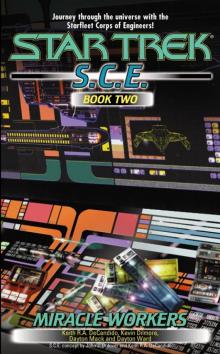 Miracle Workers
Miracle Workers Articles of the Federation
Articles of the Federation Supernatural Heart of the Dragon
Supernatural Heart of the Dragon War Stories: Book Two
War Stories: Book Two The Zoo Job
The Zoo Job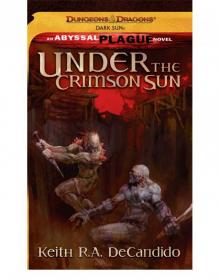 Under the Crimson Sun
Under the Crimson Sun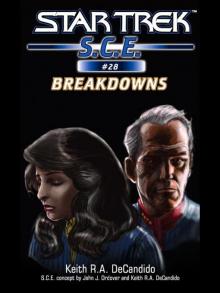 Breakdowns
Breakdowns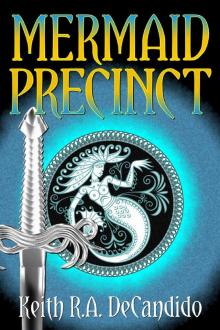 Mermaid Precinct (ARC)
Mermaid Precinct (ARC)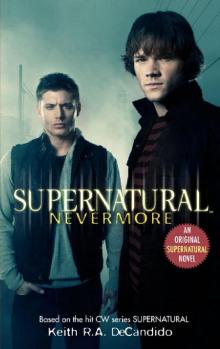 Supernatural 1 - Nevermore
Supernatural 1 - Nevermore STAR TREK - The Brave and the Bold Book One
STAR TREK - The Brave and the Bold Book One Four Walls
Four Walls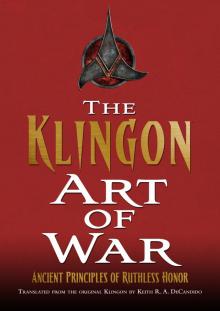 The Klingon Art of War
The Klingon Art of War Blackout
Blackout War Stories: Book One
War Stories: Book One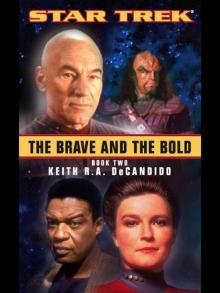 The Brave and the Bold Book Two
The Brave and the Bold Book Two Honor Bound
Honor Bound Sleepy Hollow: Children of the Revolution
Sleepy Hollow: Children of the Revolution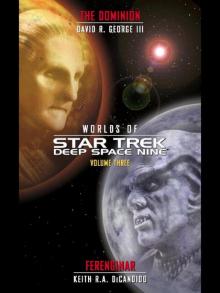 Worlds of Star Trek Deep Space Nine® Volume Three
Worlds of Star Trek Deep Space Nine® Volume Three Star Trek: TNG: Enterprises of Great Pitch and Moment
Star Trek: TNG: Enterprises of Great Pitch and Moment Genesis
Genesis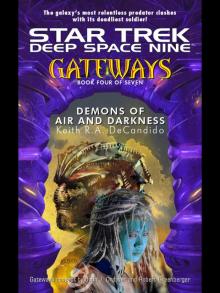 Demons of Air and Darkness
Demons of Air and Darkness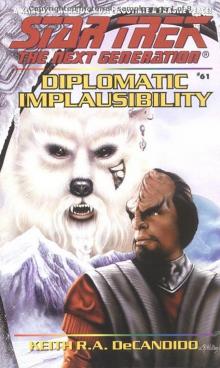 Star Trek - TNG - 61 - Diplomatic Implausibility
Star Trek - TNG - 61 - Diplomatic Implausibility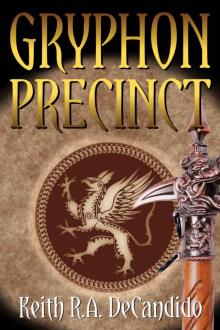 Gryphon Precinct (Dragon Precinct)
Gryphon Precinct (Dragon Precinct)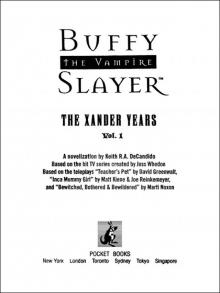 THE XANDER YEARS, Vol. 1
THE XANDER YEARS, Vol. 1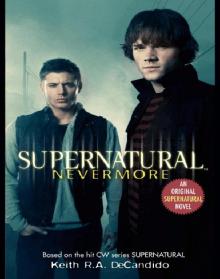 Nevermore
Nevermore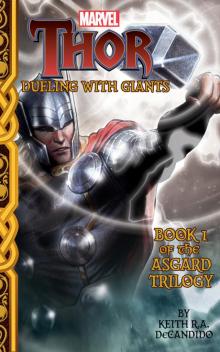 Thor
Thor The Brave And The Bold Book One
The Brave And The Bold Book One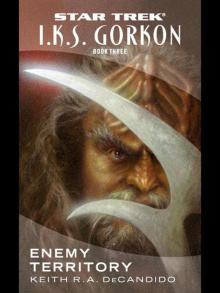 I.K.S. Gorkon Book Three
I.K.S. Gorkon Book Three STARGATE SG-1: Kali's Wrath (SG1-28)
STARGATE SG-1: Kali's Wrath (SG1-28)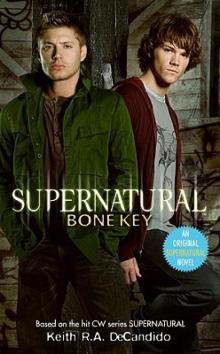 Bone Key
Bone Key Guilt in Innocece
Guilt in Innocece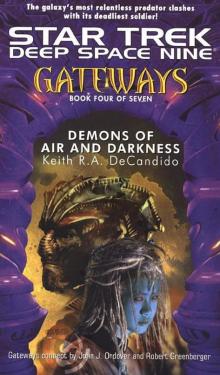 Star Trek - DS9 Relaunch 04 - Gateways - 4 of 7 - Demons Of Air And Darkness
Star Trek - DS9 Relaunch 04 - Gateways - 4 of 7 - Demons Of Air And Darkness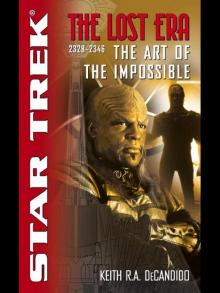 The Art of the Impossible
The Art of the Impossible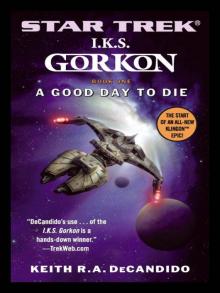 I.K.S. Gorkon Book One: A Good Day to Die
I.K.S. Gorkon Book One: A Good Day to Die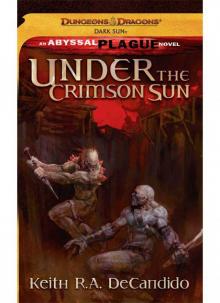 Under the Crimson Sun (the abyssal plague)
Under the Crimson Sun (the abyssal plague)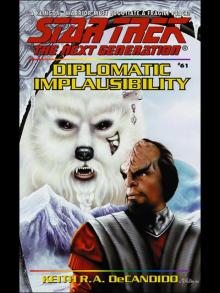 DIPLOMATIC IMPLAUSIBILITY
DIPLOMATIC IMPLAUSIBILITY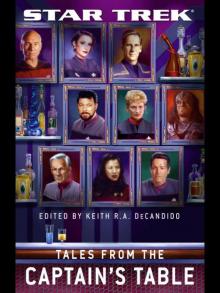 Tales from the Captain's Table
Tales from the Captain's Table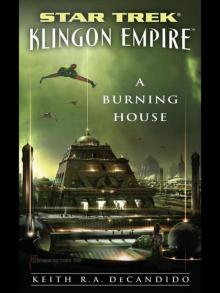 A Burning House
A Burning House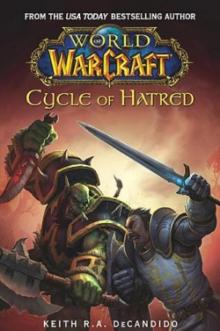 Cycle of Hatred (world of warcraft)
Cycle of Hatred (world of warcraft)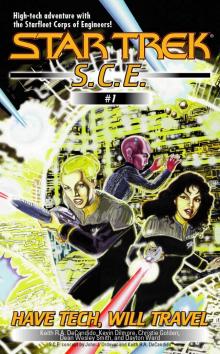 Have Tech, Will Travel
Have Tech, Will Travel Security
Security